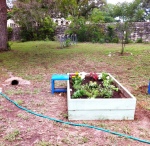We are gearing up for the summer camps coming up in June! We’ve got a few spaces left if you’re still looking for an affordable way for your children to have a memorable, inspiring, and fun summer. Each week, we will have fun, hands-on activities, theme-based projects, and lots of great books and games. We even have a few awesome field trips up our sleeves! At $175/week, it’s one of the most affordable summer options in Austin. Email us at soleil.school@gmail.com.
Here are pictures from our newly planted garden! Looking forward to more fun with soil and plants during camp.



